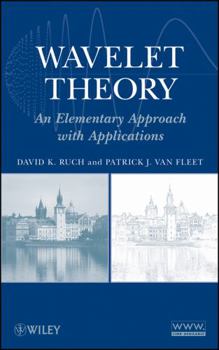Wavelet Theory
Exploring the growing relevance of wavelets in the field of mathematics, Wavelet Theory: An Elementary Approach with Applications provides an introduction to the topic, detailing the fundamental concepts and presenting its major impacts in the world beyond academia. Drawing on concepts from calculus and linear algebra, this book helps readers sharpen their mathematical proof writing and reading skills through interesting, real-world applications.
The book begins with a brief introduction to the fundamentals of complex numbers and the space of square-integrable functions. Next, Fourier series and the Fourier transform are presented as tools for understanding wavelet analysis and the study of wavelets in the transform domain. Subsequent chapters provide a comprehensive treatment of various types of wavelets and their related concepts, such as Haar spaces, multiresolution analysis, Daubechies wavelets, and biorthogonal wavelets. In addition, the authors include two chapters that carefully detail the transition from wavelet theory to the discrete wavelet transformations. To illustrate the relevance of wavelet theory in the digital age, the book includes two in-depth sections on current applications: the FBI Wavelet Scalar Quantization Standard and image segmentation.
In order to facilitate mastery of the content, the book features more than 400 exercises that range from theoretical to computational in nature and are structured in a multi-part format in order to assist readers with the correct proof or solution. These problems provide an opportunity for readers to further investigate various applications of wavelets. All problems are compatible with software packages and computer labs that are available on the book's related Web site, allowing readers to perform various imaging/audio tasks, explore computer wavelet transformations and their inverses, and visualize the applications discussed throughout the book.
Requiring only a prerequisite knowledge of linear algebra and calculus, Wavelet Theory is an excellent book for courses in mathematics, engineering, and physics at the upper-undergraduate level. It is also a valuable resource for mathematicians, engineers, and scientists who wish to learn about wavelet theory on an elementary level.





